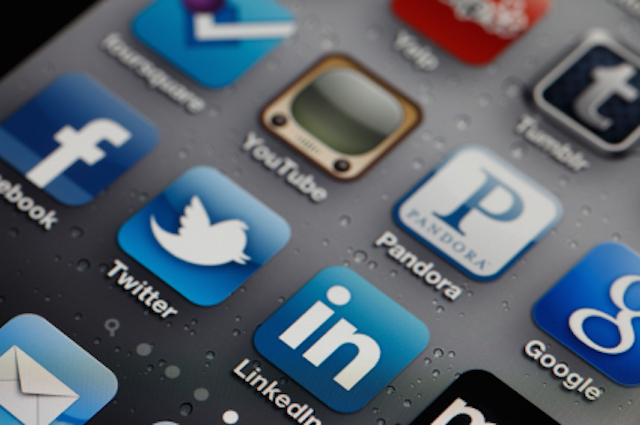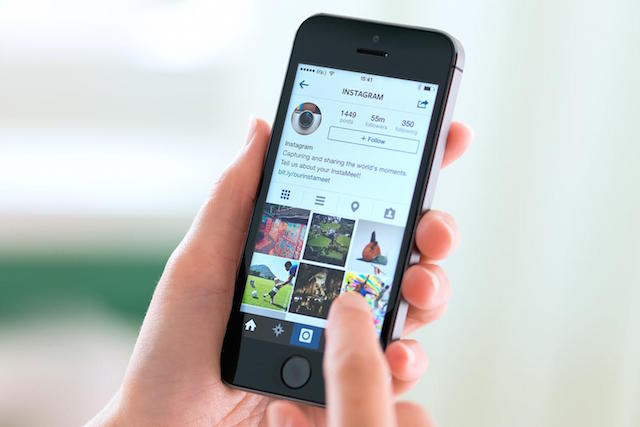(单词翻译:单击)
5.Using Social Media
5.使用社交媒体

Today, it seems like the entire world lives and breathes social media. Facebook has so many users that if the website was a country, it'd have a population slightly larger than China. Twitter is ubiquitous among journalists. Just about every teen on Earth uses Whatsapp or Snapchat.
今天,社交媒体看起来就好像整个世界的生命和呼吸。脸书有很多的用户,如果网络是一个国家的话,那么它会是一个人口略超过中国的大国。在新闻记者中推特无处不在。地球上几乎所有的青少年都在使用Whatsapp或Snapchat。
Yet social media's popularity masks a disturbing trend. Young adults and teens who use social media a lot are significantly more-likely to experience crippling depression.
然而,社交媒体的普及掩盖了一个令人不安的趋势。许多使用社交媒体的青年人和青少年明显更有可能患上严重的抑郁症。
Of course, this is a chicken and egg thing. Are social media users depressed because they use social media, or are they turning to Facebook because they are depressed? No-one can say for sure at the moment, but researchers have their suspicions. University of Pittsburgh School of Medicine's Lui yi Lin recently published one of the most wide-ranging papers on the phenomenon ever, and has identified multiple ways social media could be the cause of depression. These included young adults comparing themselves negatively to others on Facebook, indulging in procrastination, and being exposed to cyberbullying. While we're on the subject…
当然,这就是一个鸡和鸡蛋的问题。是因为使用社交媒体才使用户情绪低落,还是因为用户情绪低落才转向脸书?目前没有人能肯定地回答,但研究人员却有自己的猜测。匹兹堡大学医学院的吕逸林最近发表了一篇有关这一现象的最为广泛的论文,并从多个方面说明社交媒体可能导致抑郁症。这都包括青年人在脸书上与其他人对比比较自负、沉迷于拖延、受到网络欺凌。尽管我们在谈论这一话题……
4.Comparing Your Life to Others'
4.攀比

Comparing our situation to that of others has been a useful tool in human history. It's why you don't spend your days doffing your cap to the king – at some point in the past, someone looked at a royal and thought 'this dude's no better than me.'
在人类历史上,我们将自身情况和其他人进行比较是很有用的方法。这就是为什么你不会花费几天时间对国王脱下你的帽子——在过去,有些人看见皇家,会认为“这家伙并不比我好”。
Unfortunately, the modern world is forever ramming other people's lives down our throats. And we don't get to see a whole, or even a semi-complete, picture. Instead we see a super-sanitized version that makes everyone look like they all have the coolest lives ever. And it's driving us crazy.
不幸的是,现实世界里永远都是我们的声音扰乱着其他人的生活。我们并没有看到成品,甚至是半成品图片。相反,我们看见的是一个过度净化的样式,它让每个人看起来都像是有过最炫酷的生活。这快把我们逼疯了。
In a world of Facebook and having to project a 'brand image' of yourself 24/7, people are naturally putting all their best moments online. That almost certainly includes you. However, everyone else is then seeing these 'best of' moments and assuming the rest of the world is living some fairytale dream that's been denied to them. This almost certainly includes you, too. We don't see our peers' vanishing promotion prospects, their unhappy relationships, their crushed dreams. We see their high-paying job, their loving family, their dream holiday. And we hate them for it. Worse still, we compare what we have to this impossible ideal and kind of hate ourselves, too.
在脸书的世界中,人们会一整天的突显自己的“品牌形象”,他们会在线记录下所以最美好的时光。这其中肯定包括你。不管如何,其他人会看见这些“最美好”的时光,设想的这些其余世界童话般的生活抛弃了他们。这其中肯定也包括了你。我们没有看到同龄人失去的晋升机会、不愉快的人际关系和破碎的梦想。我们看到的只有他们的高薪工作、甜蜜的家庭和理想假期。我们憎恨他们。更糟糕的是,我们和这些现在不可能拥有的理想进行比较后,对自己也产生一种怨恨。
This 'grass is always greener' anxiety has been around forever, of course. But now it's punching us in the face, every hour of every day, every time we go online. And it might just be leading to a global crisis of depression.
“这山望着那山高”的忧虑一直围绕在身边,这当然没什么。但是现在每天的每个小时里,每一次我们上网的时候,情绪都会在我们脸上显现。也许攀比有可能会导致全球性的抑郁危机。
3.Posting Photos Online
3.在线上传照片

Interestingly, it seems most of us are intellectually aware that our peers' online image is carefully cultivated, even if our gut reaction is to feel miserable seeing it. We know this because studies have shown we have a very specific reaction to people who put pictures up online of their lives and what they're doing. We absolutely hate their guts.
比较有趣的是,我们大多数人似乎都理智的知道同龄人在线的形象都很谨慎有教养得,哪怕我们看见他的直觉反应是很不舒服。我们通过研究发现我们对于人们把他们的生活和正在做什么事情的照片上传到网上会有一个非常显著的反应。我们绝对对他们恨之入骨。
Back in 2013, a joint study by several UK universities found that 'oversharing' on Facebook caused people to alienate some friends and lose others entirely. It basically comes back to what we were saying in the last point: your awesome holiday photos make your ordinary life seem like the most-amazing life ever. This inspires a gut reaction in all but your closest friends and family, who feel pangs of jealousy at your rainbows-and-unicorn-blessed life. Even though they know you're crafting an image, they like you slightly-less for making them feel that way regardless. Over time, this can grow into real resentment.
早在2013年,由英国的几所大学联合的一项研究发现,在脸书上“过度分享”会导致人们疏远一些朋友,或彻底断绝联系。这基本上回到我们所说的那个点上:你那超棒的假期照片让你的平凡生活看起来就像超级精彩的人生。但这会激发你所以的最亲密朋友和家庭的本能反应,他们会对你的灿烂幸福生活产生一丝丝嫉妒。即使他们知道你是展现一个各具特色的形象,但是他们只会喜欢你使用一些不那么让他们有这种感觉的方式。随着时间的推移,这也许会变成真正的怨恨。
The irony is, those same people feeling resentful are likely posting the same photos anyway. By this point, we pretty much all do it. This creates a never-ending cycle of jealously and resentment that'll probably never end.
讽刺的是,同样一些人可能会因为不满而发布相类似的照片。说到这一点,我们每个人几乎都有这样做过。这将会形成一个可能永远都不会结束的无休止的嫉妒和怨恨的循环模式。
2.Telling White Lies
2.善意的谎言

Picture the scene: your girlfriend/boyfriend/significant other has just bought a new dress/pair of skinny jeans. They try them on and ask you "does my butt look big in this?" What do you say?
画面场景:你的女朋友/男朋友/重要的人刚刚买了一件新的连衣裙/一双紧身牛仔裤。他们试穿后问你“我的臀部看起来大吗?”你会怎么说?
If your answer was along the lines of "no way, hot stuff! Your butt is perfect," then congratulations. You still have a partner. But not everyone would agree you did the right thing by telling that little white lie. In fact, neuroscientist Sam Harris would argue that, by not telling the truth, you're setting your partner up for a hideous fall.
假如你回答“没问题,亲爱的,你的臀部非常完美”,那么恭喜你。你们仍然是伙伴。但并不是每个人都认为你这样说善意谎言的做法是对的。事实上,神经学家萨姆·哈里斯认为,不讲实话,你可能会给你的同伴之后的经历留下阴影。
In his 2013 book Lying, Harris argued that white lies deny our loved ones "access to reality." This causes them to act on false information (like going out in a pair of tight shorts that really don't fit), which can lead to negative consequences (getting openly laughed at by their peers). The bigger the white lie, or the more of them there are, the bigger the fall can be. In short, by declining to tell the truth, we might be hurting our partners and friends more than if we'd just admitted that their butt was a little on the large side.
哈里斯在2013年他的《谎言》一书中,认为善意的谎言让我们所爱的人无法“接近现实”。他们会对假消息信以为真(如穿着一条不合身的紧身裤外出),这将引起消极后果(遭到同龄人的公然嘲笑)。所说的善意的谎言越大,或是越多,那么他们受到的伤害可能就越大。总之,不讲实话,我们有可能会伤害到我们的同伴和朋友,这要超过我们承认他们的臀部稍大一点的伤害。
On the other hand, if you've just been dumped for calling your partner fat, don't come crying to us. Even when telling the truth, remember a little tact is probably in order, bro.
另一方面,假如你因为说你的伴侣胖而被甩,不要来找我们哭泣。兄弟,要记住,即使说真话也应该圆滑一些。
1.Googling Information
1.搜索信息

Today, we have all the information in the world at our fingertips. In under two minutes, every single person reading this can look up the third emperor of Rome (Caligula), the population of Luxembourg (543,202) and the weight of Mars (6.39 × 10^23 kg). Only a couple of decades ago, that knowledge would've required a trip to the local library. But there's a downside to all this easy-access information. It's making us stupider.
今天,我们只需滑动手指就能够浏览全世界所有的信息。只需两分钟,阅读这篇文章的每一个人都能够查阅到罗马帝国第三任皇帝(卡里古拉)、卢森堡的人口(543202)和火星的重量(6.39×10^23公斤)。然而在几十年前,这方面的知识我们只有到当地的图书馆才能查阅到。然而这些所有便捷的信息也存在一个缺点。它会让我们变傻变笨。
Because of the easy way we can access information, our brains have stopped holding onto the stuff we look up. While in 1993, forgetting the population of Luxembourg would have required another boring afternoon at the library to get that information back, now we simply have to whip out our phones again. Our brains recognize this. Instead of storing information, we're now more-likely to store where to find that information. In essence, our knowledge is just being dumped in a big, fat box in our brains marked 'Dunno. Google it.'
由于我们通过这种简单的方法就可以获取信息,因此我们的大脑已经不再对我们要查找的东西抱有期待感。在1993年的时候,如果我们忘记了卢森堡的人口数,就需要在一个空闲的下午去图书馆翻阅资料。但是现在,我们只需要再次拿出我们的手机就可以了。取代大脑储存信息,我们现在更喜欢在商店找到信息。我们的大脑已经意识到这一点。从本质上讲,我们的知识已被丢弃在一个大的脂肪盒子里,大脑会潜意识的告诉我们“不知道,Google一下吧”。
At the same time, this flood of information is causing our attention spans to decrease. In 2000, the average attention span was a paltry 12 seconds. Now it's an even-paltrier 8. It's estimated that this century may see the first time that global IQ scores fall in history. We may have access to information to make us all smart, but paradoxically, it may be making us dumber.
同时,大量的信息内容使我们的注意力减退。在2000年,人的平均注意力只有12秒。现在仅有微不足道的8秒。据估计,本世纪可能会看到历史上第一次全球性的智商下降。我们可以通过获取信息使我们变聪明,但比较矛盾的是,它也可能会让我们变笨。


